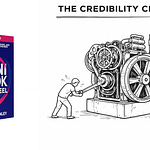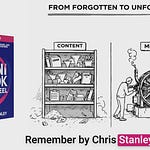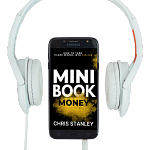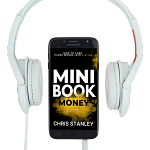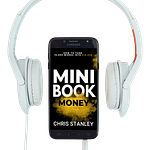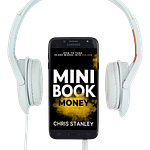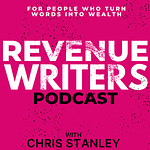In this special episode of the Revenue Writers Podcast, host Chris Stanley brings you exclusive clips from the very first Mini Book Hall of Fame — featuring none other than Christopher Lochhead and Eddie Yoon of Category Pirates 🏴☠️.
These are the legends who started the Mini Book a movement.
You’ll hear:
Why most business books are just blog posts stretched over 300 pages
How Category Pirates created a whole new model for publishing
What they learned from going direct-to-reader with Substack and Amazon
Why Mini Books are like “over-the-air software updates” for your audience
If you’re a creator, founder, or revenue writer who wants to scale your ideas with precision and speed…
This is the episode.
TRANSCRIPTION
Hey, revenue writers. Welcome back to the Revenue Writers Podcast. This is your host, Chris Stanley, and today I got a special treat for you back in November, way back in the day, uh, we hosted our very first annual mini book Hall of Fame, and what we did is we inducted two different authors into the mini book Hall of Fame, interviewed them.
And, uh, let them basically guess present at that time, along with some other, uh, great presenters from Substack on the topic of mini books. But over the next few episodes, I'm gonna be sharing clips from that event, specifically from category Pirates at this point in time. So category pirates, uh, are the ones who I first heard about the mini book format from.
They're where I got it from. So I'm gonna let them talk about it and their words. And this is me interviewing them for the mini book Hall of Fame event. Enjoy it. Hope you learn a lot and make sure you listen all the way to the end of this episode to hear about what they say about , over the air software updates.
So we're gonna jump right into this interview where you're first gonna hear Christopher Lochhead of Category Pirates, and then later in the uh, clip you'll hear Eddie Yoon. And if you don't know Category Pirates writes as a writing band. There's actually three people to it, but in this interview there's only two.
And, and we solved a very specific problem. So it's important with category design to understand. It all starts with what's the customer's problem or opportunity that you're solving. And here's the insight. The insight is most business books, if they're good, are a blog post stretched over 350 pages. And so we said, well, let's just write the post.
And so that was another part of it too, which was wanting to be able to deliver book level value and impact in, let's call it plus or minus 5,000 words, and cut out all the crap Ola and make every mini book stand on its own and as valuable as a $30 300 5450 page book. To solve a problem for readers, which is right.
I don't wanna read a blog post, dragged over 350 pages, if, if it's 5,000, 6,000, 8,000, whatever, whatever the number is, 3000. Great. Write what needs to be written and not one more word. And, and, and by self-publishing, and Eddie and I had both been published by major, very prestigious publishers, we were under no pressure to have to do anything right.
So we could just write this way. And then the fun thing was we told everybody this is exactly what we're gonna do. And we told them, we're very explicit that this will then turn up as a book. And so if you wanna wait for the book and you don't wanna subscribe to the Substack, by all means if that's how you prefer.
So there's another thing that under underpins this as well, which is the kinks, one of the great bands that hardly gets celebrated anymore. Had a record called Give the People What They Want and in Media today we can do this. So we give you a mini book twice a month on Substack. We convert those mini books into purchasable mini books on Amazon.
So if you don't wanna subscribe to the Substack, but you just wanna pick and choose certain topics as they come out, great. You can just buy that mini book on Amazon. And we also, of course, turn it into a big book. And we also, of course not, not every, uh, mini book, but on occasion we will do, uh, what most people call a podcast, where we'll discuss the ideas in it.
Sometimes we do it ahead of dropping it to kind of, uh, uh, uh, share with people what's coming. A lot of people like that, and it's sort of inside the studio with the band stuff, you know? And so the point is the following. However you like to consume information. If you like it more mini book style and you wanna subscribe on Substack, great.
Pick and choose on Amazon. Great. Wait for the big book. Great. And then there's one other thing and I'll, I'll pass the puck to Eddie for this one. We also knew because primarily of his leadership that super consumers are gonna buy often, if not all of it. A lot of it.
That was me. I was all of it. Like, it's like on the substack and, oh man, I wanna read this one on my Kindle.
I want to take it off of, uh, my phone. This one is so good. I think when Magic Triangle hit, I was like, uh, hey, I need this in my bed at night. Like, and then when Snow Leopard came out, I'm like, this thing's highlighted to Hank. Oh, I need the print version. Oh, I got the special edition cover version. When you guys got revoked from Amazon.
The whole thing, like, it was like, wow, like. You guys nailed it on that side. And you know,
Chris, just on that, what one, the thing that is, if you think about the mini book, um, you know, not just on its own, but in the context of learning and education in general, what the mini book actually is for us is, um, it's over the error software updates.
Right. In in the same way that. Tesla will just get, oh, it's better now, right? It just came over the air and it's updated and this and that. Like a lot of the ideas that we have, um, you know, some would say, oh, I, I know that Christopher has talked about this beforehand, but when you have an over there, uh, update, new category, science, new case study, a new framework for how to approach it and this and that new application, then it's like, oh, it, it's so much better of a, of a thing.





